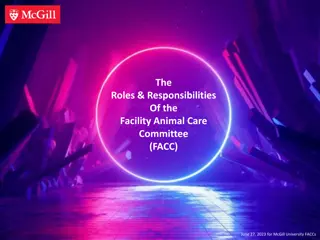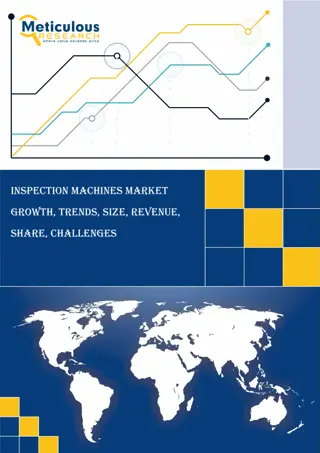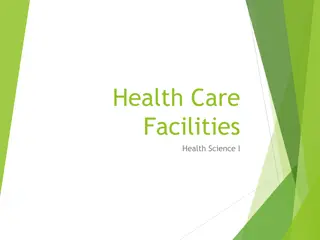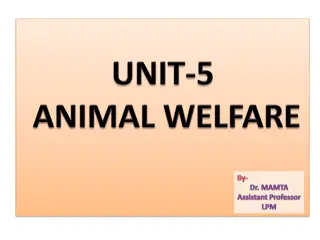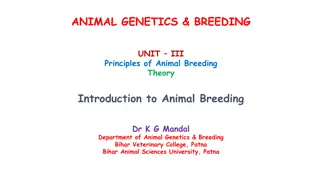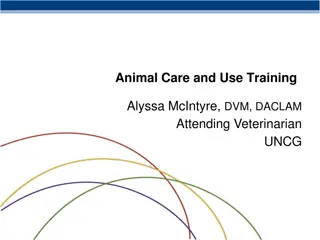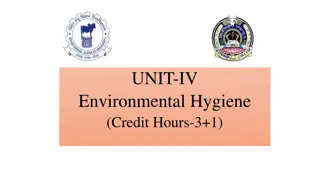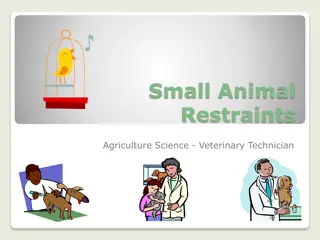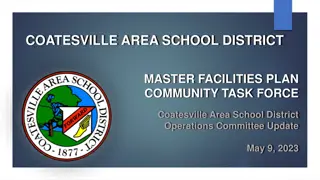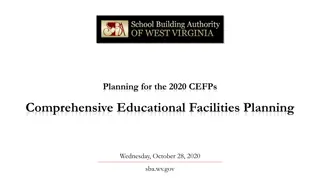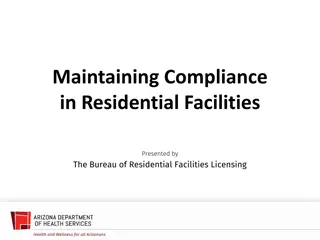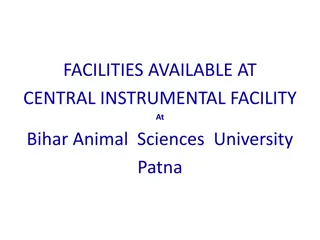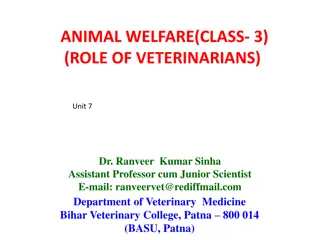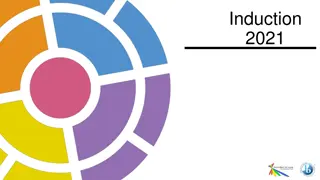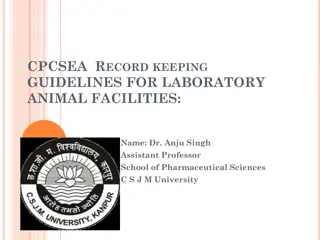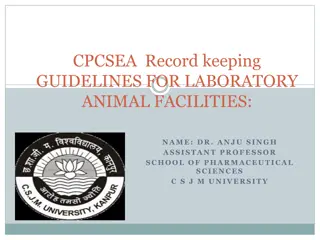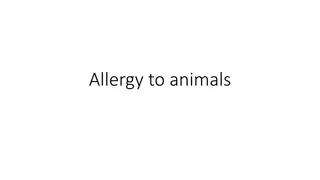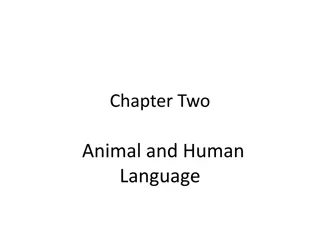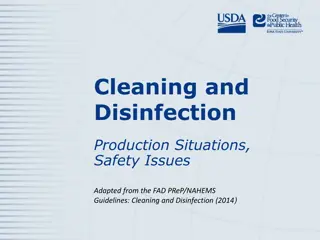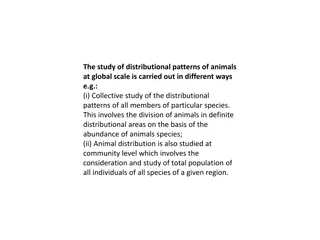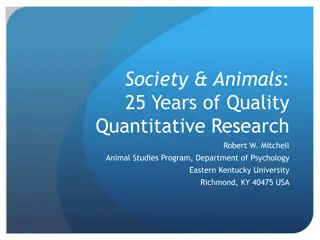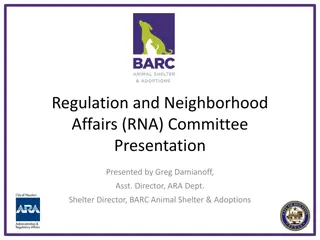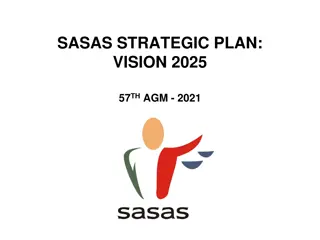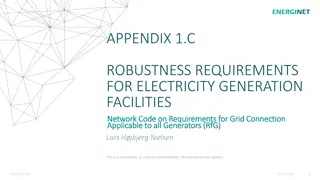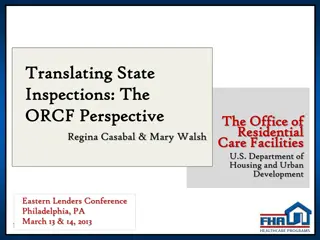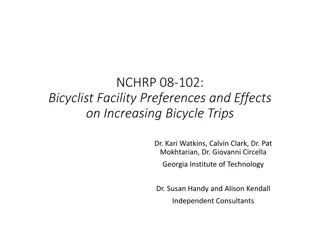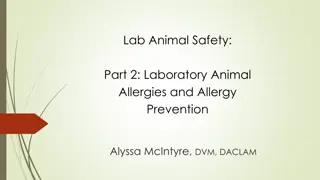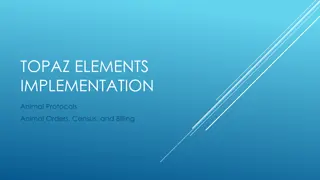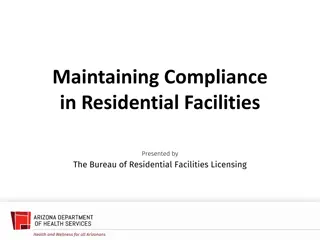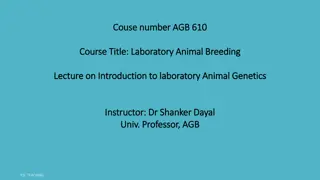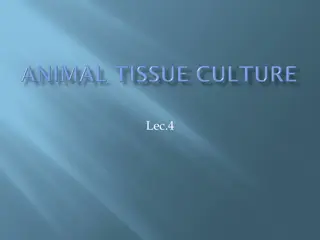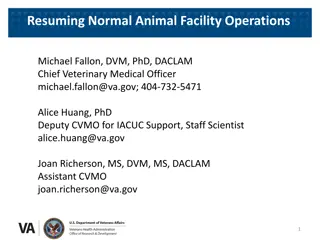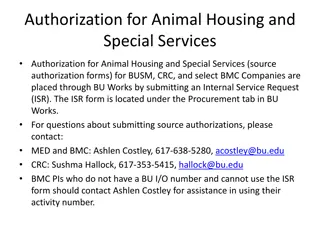History and Educational Programs of DEU Lab Animal Science Department
Established in 2004, the Department of Laboratory Animal Science at Dokuz Eylul University Institute of Health Sciences offers cutting-edge education focusing on animal welfare and ethical practices in scientific research. The department upholds the 3R Principle—Reduction, Refinement, Replacement�
0 views • 9 slides
Responsibilities of Facility Animal Care Committee at McGill University
The Facility Animal Care Committee (FACC) at McGill University oversees animal activities, ensures ethical treatment of animals, and adheres to guidelines from organizations such as the Canadian Council on Animal Care (CCAC). Responsibilities include continual oversight of animals, approving care pr
1 views • 13 slides
Feed Software Market is expected to reach $456.1 million by 2030
The growth of this market is attributed to the adoption of digital technologies and automation in the animal feed industry, the growing animal population, increasing demand for healthy animal-based food products, increasing animal health expenditure and pet insurance, and the growing need to reduce
0 views • 4 slides
Health Care Facilities
Explore a comprehensive guide to various health care facilities, including hospitals, long-term care facilities, medical offices, and clinics. Learn about the types of hospitals, such as general, specialty, government, and university hospitals. Discover the functions of long-term care facilities lik
0 views • 9 slides
Animal Welfare and Ethics: Standards and Regulations in India
The content covers a wide range of topics related to animal welfare, ethics, and laws in India. It delves into the definition of animal welfare, the role of veterinarians, animal welfare organizations, regulations like the Prevention of Cruelty to Animals Act, and protection of wildlife, working ani
0 views • 15 slides
Principles of Animal Breeding: Introduction and Historical Perspective
This unit covers the introduction to animal breeding, the application of genetics principles in breeding, historical perspectives including the work of Robert Bakewell, and key events in animal breeding evolution. Topics include breeding systems, importance of animal breeding, and notable figures in
1 views • 12 slides
Importance of Training in Animal Care and Use for Research
Training in animal care and use is essential to ensure humane and appropriate treatment of research animals, promote regulatory compliance, and uphold high standards of science and animal well-being. The presentation covers the necessity of training, goals including reviewing animal use and identify
0 views • 53 slides
Proper Ventilation for Animal Houses: Importance and Guidelines
Ventilation in animal houses is crucial for removing stale air and replacing it with fresh air to maintain optimal conditions for animals and their attendants. Improper ventilation can lead to various issues like high humidity, disease spread, and vulnerability to pathogens. This article discusses t
0 views • 12 slides
Small Animal Restraints and Safe Handling Practices in Veterinary Technology
Importance of safe practice when working with small animals includes preventing harm, reducing injury, and minimizing stress. Proper animal handling methods and tools are crucial for the safety of both animals and handlers. Common methods of handling different species, demonstrating appropriate anim
1 views • 22 slides
Understanding the Difference: Animal Rights vs. Animal Welfare
Explore the nuanced distinction between animal rights and animal welfare, delving into the ethical considerations, philosophies, and advocacy efforts surrounding these concepts. Discover how animal rights proponents emphasize the equal rights of animals, while animal welfare focuses on humane treatm
0 views • 36 slides
Coatesville Area School District Facilities Investment Plan Update
The Coatesville Area School District Operations Committee provided an update on the Master Facilities Plan, emphasizing the educational impact of facilities on student performance. The Community Task Force outlined priorities for renovations and new constructions to enhance student learning environm
0 views • 13 slides
Facility Improvement Suggestions for Sailing Club
Detailed suggestions for enhancing facilities at a sailing club include needs and wants across various areas such as race management, changing rooms, galley facilities, dinghy berthing, social areas, training resources, and more. Specific needs like good slipway access and comfortable amenities are
0 views • 12 slides
Comprehensive Educational Facilities Planning Overview
Comprehensive Educational Facilities Planning is essential for identifying current and future facility needs, predicting life-cycle costs, and accommodating educational innovations. The process entails creating an ongoing implementation plan that acts as a to-do list for facilities and fosters commu
0 views • 33 slides
Ensuring Compliance in Residential Facilities by Arizona Department of Health Services
Presented by the Bureau of Residential Facilities Licensing, this training emphasizes the importance of compliance with Arizona's rules and statutes for various residential healthcare facilities. The program covers survey types, Plan of Correction preparation, common deficiencies, Compliance Team in
2 views • 73 slides
State-of-the-Art Facilities at Central Instrumental Facility, Bihar Animal Sciences University, Patna
The Central Instrumental Facility at Bihar Animal Sciences University in Patna offers a range of cutting-edge equipment for research purposes, including an electroporator, bench-top flow cytometer, real-time PCR machine, inverted fluorescence microscope, and more. Researchers can utilize these facil
0 views • 27 slides
Role of Veterinarians in Animal Welfare
Veterinarians, especially with the increasing number of female professionals in the field, play a crucial role in promoting animal welfare through daily practices, advocacy, education, and research. They are involved in various sectors like biomedical, wildlife, and farm animal research, as well as
3 views • 10 slides
Exploring Animal Management and Sociology in Education
Discover the intersection of animal management and sociology in education through a comprehensive course structure that covers topics ranging from animal welfare and ethics to practical husbandry. Dive into the significance of animal care in the UK economy and learn about various career paths in thi
2 views • 19 slides
Laboratory Animal Facilities Record-keeping Guidelines
Guidelines for maintaining records in laboratory animal facilities include provisions for animal housing, staff records, health monitoring, and standard operating procedures. Compliance with CPCSEA regulations ensures ethical review procedures for animal research proposals. Focus is on providing a s
6 views • 11 slides
Guidelines for Recording Keeping in Laboratory Animal Facilities
The Committee for the Purpose of Control and Supervision of Experiments on Animals outlines the importance of maintaining detailed records in laboratory animal facilities to ensure the well-being and proper management of animals used in experiments. Records ranging from animal house plans, staff hea
4 views • 5 slides
Understanding Allergies to Animals and Living Organisms
Allergies to animals and living organisms are a result of specific immune processes triggered by allergenic substances like proteins and peptides. This allergic response can be caused by various animal proteins such as dog allergens Can f.1, Can f.2, and Can f.3, and cat allergen Fel d1. The represe
1 views • 10 slides
Uniqueness of Human Language and Communication Contrasted with Animal Communication
Human language possesses unique properties such as reflexivity, displacement, and arbitrariness, setting it apart from animal communication. These distinctions enable humans to communicate abstract concepts, discuss past and future events, and use arbitrary linguistic forms. The contrast between hum
1 views • 17 slides
Guidelines for Cleaning and Disinfection in Animal Production Facilities
Explore key guidelines for cleaning and disinfecting various animal production facilities, including poultry, dairy, swine, equine, and aquaculture. Specific challenges and safety considerations for each type of facility are discussed, highlighting the importance of using appropriate products and te
0 views • 18 slides
Understanding Global Animal Distribution Patterns
The study of animal distribution patterns at a global scale involves analyzing species abundance and diversity in specific areas. Factors like environmental conditions, latitudes, and evolutionary history influence animal distributions. There are horizontal and vertical zones of animal distribution,
1 views • 25 slides
Proposed Facilities Referendum Overview in Montgomery Township School District
Explore the need for a proposed facilities referendum in Montgomery Township School District, detailing the reasons behind it, the facilities needs assessment, board committee review, and recommended projects such as improvements at Montgomery High School and Upper Middle School. Discover how this r
0 views • 17 slides
Exploring Human-Animal Interactions through 25 Years of Quality Research
Delve into the interdisciplinary realm of human-animal interactions with a focus on social sciences and quantitative research. Discover key themes such as social psychology, therapy, animal welfare, and more. Explore attitudes and personality differences related to animal treatment, empathy, and bel
1 views • 26 slides
Skagit County Capital Facilities Plan Update Overview
Skagit County is updating its Capital Facilities Plan to ensure public facilities and services support future development without decreasing current service levels. Internal changes include relocation of the Public Health Department and upgrades to facilities, while external changes involve updates
0 views • 6 slides
BARC Animal Enforcement Programs and Protocols
BARC Animal Enforcement is responsible for addressing dangerous, aggressive, and nuisance dog cases in the community. Through a structured priority matrix and enforcement tools, BARC aims to ensure public safety and animal welfare. The process involves investigation, designation determination, and c
0 views • 15 slides
SASAS Strategic Plan Vision 2025 - Summary and Objectives
The SASAS Strategic Plan Vision 2025 aims to develop capacity in animal science to enhance animal production systems sustainably, promote welfare, job creation, and poverty alleviation. Informed by local, regional, and global imperatives, it aligns with the National Development Plan 2030, African Un
0 views • 11 slides
Robustness Requirements for Electricity Generation Facilities
The document outlines robustness requirements for electricity generation facilities, covering fault-ride-through properties, clear time and voltage parameters for different types of generation facilities connected to both the distribution grid and transmission grid. Specific requirements for synchro
0 views • 8 slides
Importance of Licensure Compliance in Residential Care Facilities
This presentation delves into the critical role of licensure compliance in ensuring the success and viability of residential care facilities. The focus is on the Office of Residential Care Facilities' (ORCF) perspective, emphasizing the significance of maintaining provider status/licenses in securin
0 views • 39 slides
Integrated Healthcare Waste Management and WASH in Healthcare Facilities
National Workshop on Integrated Healthcare Waste Management (IHCWM) and Water Sanitation & Hygiene (WASH) in Healthcare Facilities highlighted the importance of following national standards, guidelines, and strategies for effective management of healthcare waste and ensuring proper water, sanitation
0 views • 32 slides
Understanding Bicyclist Facility Preferences for Increasing Bicycle Trips
This research study aims to investigate the various preferences and effects of different bicycle facilities on increasing bicycle trips. It explores how individual preferences for bike facilities differ and the effectiveness of these facilities in attracting new trips. The study delves into the impa
0 views • 52 slides
Understanding Laboratory Animal Allergies and Prevention
Laboratory animal allergies pose a significant occupational hazard, with around 2 million workers at risk. Exposure routes include inhalation, skin contact, and ingestion. Factors such as pre-existing allergies, intensity of exposure, and secondhand exposure influence the likelihood of developing al
0 views • 30 slides
Upgrading to TOPAZ Elements: Enhancing Animal Protocols, Orders, Census, and Billing
The Animal Resource Facility (ARF) and Office of Animal Care Compliance (OACC) are shifting to TOPAZ Elements, a comprehensive web-based system, to streamline management of animal protocols, orders, census, and billing. This upgrade aims to provide better oversight for PIs, enhance compliance with r
0 views • 8 slides
Guidelines for Compliance in Residential Facilities by Arizona Bureau
This comprehensive document outlines the compliance guidelines for residential facilities, presented by the Bureau of Residential Facilities Licensing in Arizona. It covers topics such as surveys, Plan of Correction preparation, common deficiencies, enforcement trends, and navigating additional reso
0 views • 73 slides
Institutional Referral Process for Single Adults from Inpatient Departments to DHS Facilities
This presentation outlines the institutional referral process for single adults from inpatient departments of healthcare facilities to DHS facilities, focusing on screening referrals, coordinating care for medically appropriate individuals, and improving health outcomes. It covers goals, the shelter
0 views • 51 slides
Understanding Laboratory Animal Genetics and Research Importance
This course (AGB 610) delves into the realm of laboratory animal breeding, exploring the significance of using animals in research and teaching. Dr Shanker Dayal, a distinguished professor, guides students through lectures on animal genetics and the common uses of laboratory animals. The course emph
0 views • 14 slides
Understanding Animal Tissue Culture and Cell Line Production
Animal tissue culture involves growing tissues separate from the animal in a laboratory setting. To achieve exponential cell growth, cells are converted into immortal cell lines. The production of a cell line involves steps like breaking cell adhesion, incubation, and transferring cells to fresh med
0 views • 22 slides
Animal Facility Operations Resumption Guidelines Amid SARS-CoV-2 Pandemic
Amid varying impacts of the SARS-CoV-2 pandemic on animal research facilities, guidelines have been issued to help resume normal operations. Emphasis is on ensuring animal care, staff health, and effective separation of research and care activities through strategies like social distancing and PPE u
0 views • 15 slides
Authorization for Animal Housing and Special Services Process Guidelines
The guidelines outline the process for authorizing animal housing and special services at BUSM, CRC, and select BMC Companies through BU Works via Internal Service Requests (ISR). Investigators must submit ISR forms for animal housing at the Animal Science Center, monitor charges, and provide advanc
0 views • 8 slides

